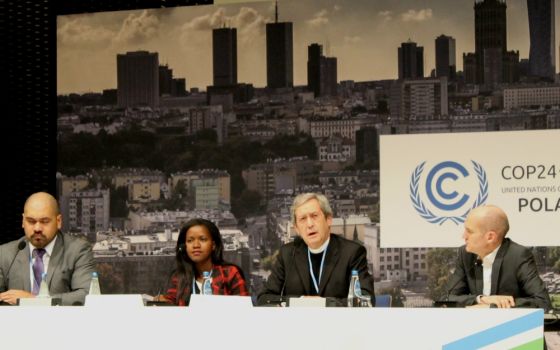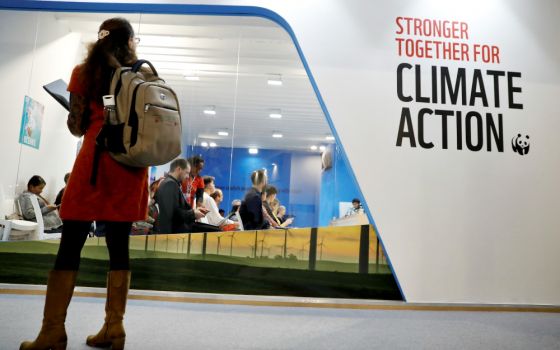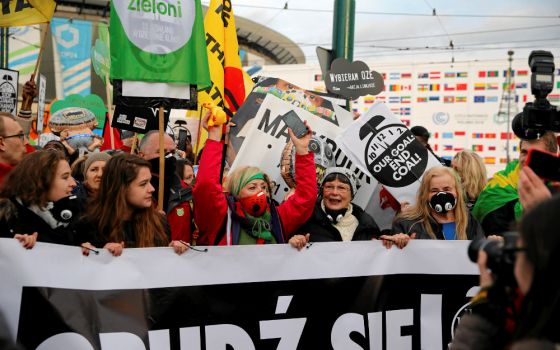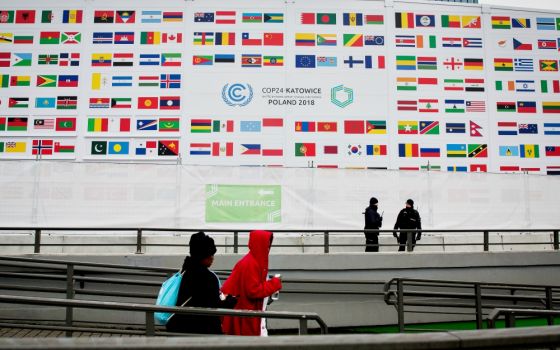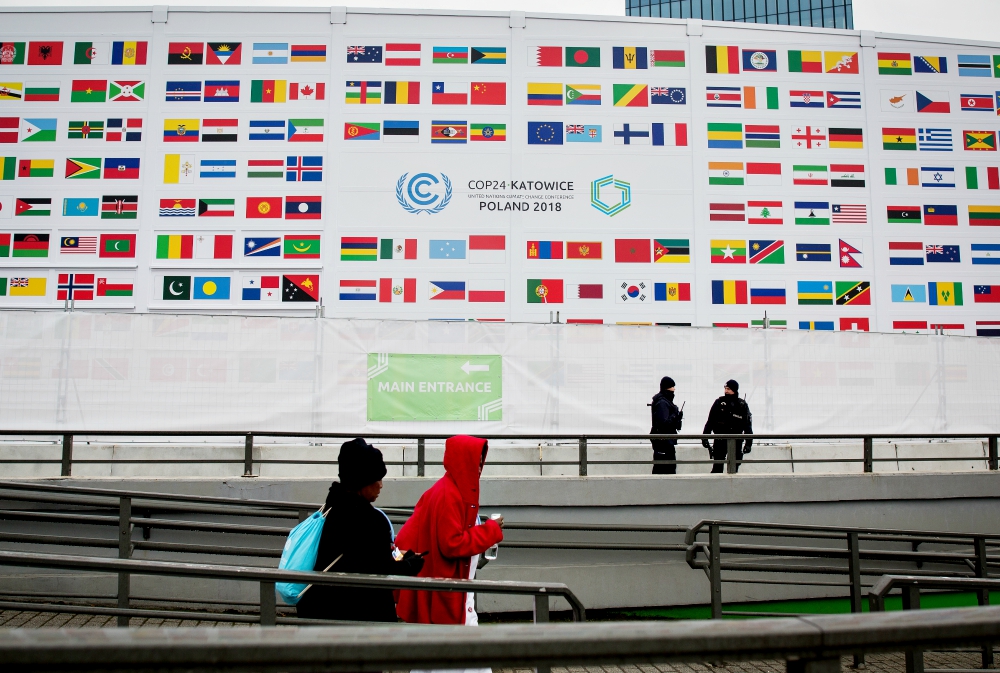
People walk past the International Congress Center during COP24, the U.N. climate change conference in Katowice, Poland, Dec. 3. (Sipa USA/NurPhoto/Mateusz Wlodarczyk)
The science says time is running short. Reports say nations are woefully behind pace.
It's against that backdrop that the latest United Nations climate summit opened in Poland this week. The Vatican and Catholic organizations, drawing on papal teachings from John Paul II on through Francis, have joined the wider effort in the conference's first days and those before it to impress upon world leaders the need for a more rapid response to meet "a challenge of civilization," as scientists project dangerous warming of the planet just decades away.
The annual United Nations climate change conference, COP24, began Dec. 2 in Katowice, Poland, a historical center of coal mining in a country that leads Europe in coal production. While the fuel source has spurred worldwide growth since the Industrial Revolution, its burning has also emitted heat-trapping carbon dioxide into the atmosphere, one of the greenhouse gases that have spiked global temperatures since the 1880s.
While Katowice is considered Poland's "greenest" city, early attendees at COP24, which has several coal companies among its sponsors, have noted coal displays in the exhibition center, and reported a thick smog hanging over the southern city.
Hanging, too, is a sense of foreboding if the present pace of response to climate change persists.
"We are in trouble. We are in deep trouble with climate change," U.N. Secretary-General António Guterres said, mincing few words in his opening remarks for the conference.
"It is hard to overstate the urgency of our situation. Even as we witness devastating climate impacts causing havoc across the world, we are still not doing enough, nor moving fast enough, to prevent irreversible and catastrophic climate disruption," he said.
At COP24, world leaders are expected to finalize a rulebook for implementing the Paris Agreement, including how countries will report their progress, or lack of, in meeting their nationally determined pledges to lower greenhouse gas emissions. It will also serve as the first time they officially take stock of where they stand in meeting the goals they set in Paris in December 2015. Through the Paris Agreement, 195 countries agreed to work together to hold average global temperature rise "well below" 2 degrees Celsius (3.6 degrees Fahrenheit) and work to limiting it to 1.5 C (2.7 F).
Recent reports from U.N. scientific bodies highlighted the "robust differences" between a world of 2 degrees warming versus 1.5 degrees. Half a degree less of warming means preventing hundreds of millions of people from falling into poverty while protecting upward of 420 million from exposure to severe heat waves, and tens of millions from rising seas.
"We are seeing in our programs that we need to help people adapt to changing climate as the frequency and severity of shocks threaten to keep people in a cycle of poverty," said Lori Pearson, senior policy adviser on food and climate change for Catholic Relief Services who is in Katowice for the first week of COP24.
Cardinal John Ribat of Port Moresby, Papua New Guinea, in an op-ed Nov. 27 for the U.K.'s Catholic Herald stated that the consequences of climate change "are not equally borne," that the very poor and the very young "are more likely to live in a house that can be washed away by a strong storm. They are more likely to lack the resources needed to escape the storm's path. They are more likely to have no way to rebuild a home, replant a field, restart a school."
"The difference between 1.5C and 2C of warming is the difference between prosperity and poverty, life and death, protecting 'the least of these' and ignoring their pleas for help," he said.
Pearson called it "essential" that the meeting complete the Paris Agreement rule book to ensure its implementation and success. Along with that, CRS and other Catholic aid organizations are looking for a reaffirmation of the climate accord's goals.
"We hope to see reinforced commitments in the face of [the new Intergovernmental Panel on Climate Change] report and the understanding that changes are happening more quickly than earlier estimates," she said.
In a statement ahead of COP24, Caritas Internationalis, the Catholic Church's umbrella aid organization, called on every government "to adopt more ambitious targets and replace fossil fuels with ecologically-sound sustainable renewable energy by 2050 at the latest." Caritas Internationalis will have a delegation in Katowice.
The need to decarbonize the global economy by midcentury in order to avoid warming of 1.5 was reiterated in the latest report, released in October, from the U.N. Intergovernmental Panel on Climate Change. It predicted that, under current emissions rates, the planet is on track to reach that level as early as 2030.
A separate U.N. report reaffirmed that the emissions reduction plans countries put forth in Paris are "inadequate," holding warming to 3 C by the end of the century, and that absent more ambitious actions, the planet will cross the 1.5 mark by 2030. In addition, most nations — including the United States, Canada, South Africa and the European Union — are behind in hitting their initial Paris pledges.
Twenty of the warmest years on record have occurred in the past 22 years, with 2018 on track to be the fourth warmest. Emissions rose again in 2017, after three years of leveling off. The past year has witnessed massive wildfires in California and severe flooding in Kerala, India.
"Climate change impacts have never been worse. This reality is telling us that we need to do much more — COP24 needs to make that happen," said Patricia Espinosa, executive secretary of the U.N. Framework Convention on Climate Change.
The "call for ambitious and immediate action" was also made in late October by bishop heads of five continental episcopal conferences in a joint statement urging COP24 delegates to pursue transformation in the energy, agriculture and finance sectors, as well as advocating "bold steps" within the wider Catholic community "to live the change we call for within our institutions."
In his address Monday, Dec. 3, Cardinal Pietro Parolin, Vatican secretary of state and one of the leaders of the Holy See delegation, extended Pope Francis' "closeness, support and encouragement" for the climate gathering. Parolin said the scientific data "clearly show the urgent need for swift action," but that technology alone will not solve "an issue increasingly more moral than technical."
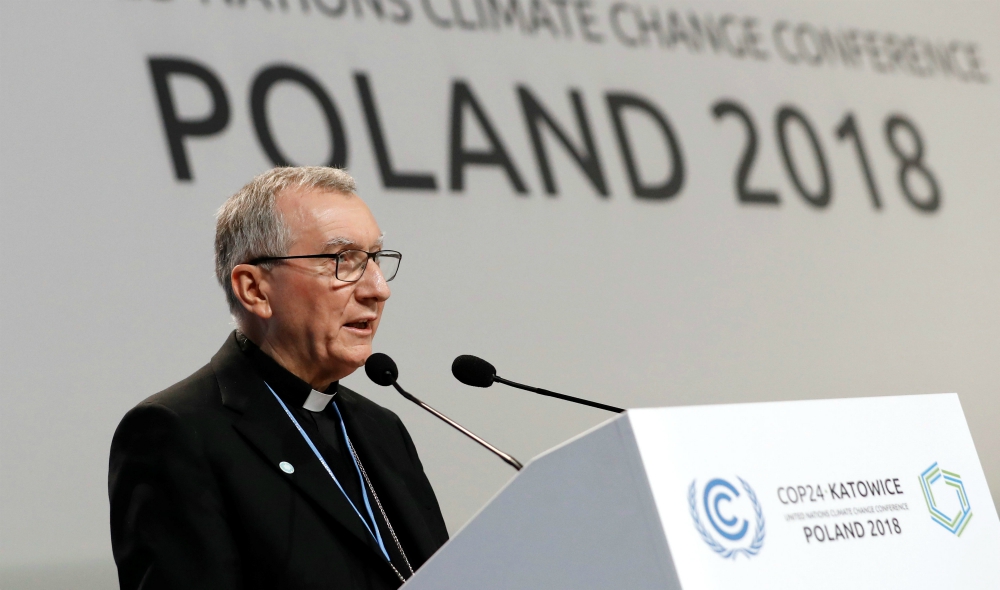
Cardinal Pietro Parolin, Vatican secretary of state, speaks Dec. 3 during the U.N. Climate Change Conference in Katowice, Poland. (CNS/Reuters/Kacper Pempel)
"We are standing before a challenge of civilization for the benefit of the common good. ... In the face of such a complex issue as climate change, where the individual or the national response in itself is not sufficient, we have no alternative but to make every effort to implement a responsible, unprecedented collective response, intended to 'work together to build our common home,' " Parolin said, quoting Francis.
"It is still possible to limit global warming," Parolin added, "but to do so will require a clear, forward-looking and strong political will to promote as quickly as possible the process of transitioning to a model of development that is free from those technologies and behaviors that influence the over-production of greenhouse gas emissions." Such a model would promote sustainable consumption and production patterns, and foster a change in lifestyle, he said.
The Vatican chief diplomat also stressed the importance of a "just transition of the workforce," a theme that has garnered steam in Poland in terms of what the near-elimination of coal as a source of energy means for families and communities whose livelihoods depend on it.
"A just transition of the workforce and the creation of decent work is significant and must be combined with due attention to aspects such as respect for fundamental human rights, social protection and the eradication of poverty, with particular attention given to those people most vulnerable to climate extremes," Parolin said.
A number of Catholic events will dot the two weeks of COP24, which concludes Dec. 14. CIDSE, a network of 17 Catholic development agencies, is organizing a number of them, and bringing 100 young Catholic volunteers from around the globe to speak to their experiences pushing for climate justice in their local communities.
Around the midpoint, a group of climate pilgrims will arrive in Katowice, after beginning their walk Oct. 3 in Rome.
Along the way, one pilgrim, Alan Burns, died in his sleep. His wife wrote in a blog post, "He lived his life as he hoped others would, and I think died doing exactly what he wanted to be doing — helping to save the world."
On Sunday, COP24 prayer cards were passed out in all 10,000 Catholic parishes in Poland, a campaign through the Polish bishops' conference, Caritas Poland and Global Catholic Climate Movement. The prayer cards will also be distributed Dec. 9, the day before the high-level segment of COP24 begins.
The prayer cards feature a quote from Pope John Paull II, once the cardinal-archbishop of Krakow, who in his 1990 World Day of Peace Message addressed "the gradual depletion of the ozone layer and the related 'greenhouse effect' [that] has now reached crisis proportions as a consequence of industrial growth, massive urban concentrations and vastly increasing energy needs. ... I wish to repeat that the ecological crisis is a moral issue."
Tomás Insua, Global Catholic Climate Movement executive director and co-founder, said the group has worked with the Polish bishops over the past year to raise the issue of climate change in a country that's 97 percent Catholic, and educate about Francis' encyclical "Laudato Si', on Care for Our Common Home."
On the feast of St. Francis, the Polish bishops issued a pastoral letter on air pollution, noting that at least 30 of the 50 European cities with the most polluted air are within its borders. At one point, the bishops bluntly said, "Smog kills," noting nearly 40,000 Polish people who die annually from polluted air they breathe.
"It's interesting to see how the [Polish] church is really taking seriously this as a life issue — people are literally dying — and they're connecting the dots to their domestic reality of air pollution," Insua said.
At the same time, he acknowledged the "very significant challenges" that come with talking about climate change in the coal-producing country, saying the prevalence of climate denial in some ways mirrors the U.S.
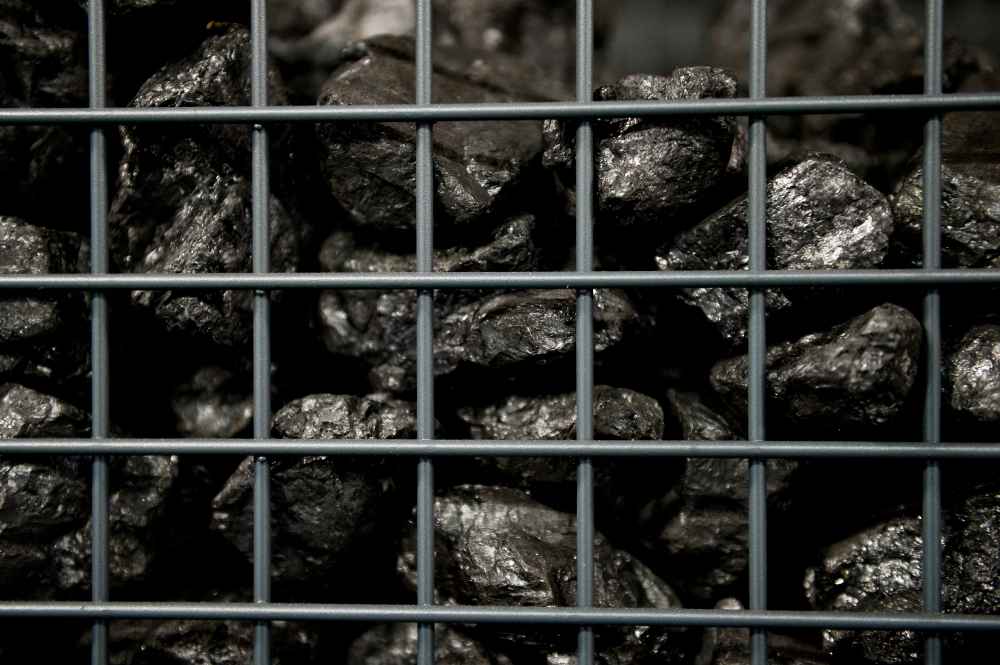
Pieces of coal are displayed at Poland's stand during COP24 in Katowice, Poland, Dec. 4. (Newscom/ZUMA Press/Omar Marques)
President Donald Trump has stated his intention to withdraw the U.S. from the Paris Agreement at the earliest opportunity (November 2020) — the only country to do so, though newly elected Brazilian President Jair Bolsonaro has also suggested a similar move and has already canceled hosting next year's U.N. climate conference — and was the lone holdout among world leaders at the recently concluded G-20 summit on a joint statement reaffirming the Paris Agreement.
The Trump administration largely dismissed a report, released on Black Friday, Nov. 23, from 13 federal agencies that summarized how climate change is already impacting the U.S., and the threats it poses to human health, coastal communities, infrastructure and the economy.
"For those of us in wealthier countries, it means we must be far more mindful of our environmental impact and find ways to reduce that impact, especially in our patterns of consumption," the Catholic Climate Covenant said in a statement on the Fourth National Climate Assessment.
The New York Times reported Monday, Dec. 3, that the Trump administration is speeding up efforts to begin oil drilling in the Arctic National Wildlife Refuge in Alaska before the 2020 election. At COP24, the U.S. delegation is set to hold an event Dec. 10 promoting coal and fossil fuels, according to Reuters. The official U.S. delegation held a similar event last year at COP23 in Bonn, Germany.
That same day, the Pontifical Academy of Sciences will hold its own daylong symposium at the University of Silesia in Katowice, bringing together faith leaders and scientists. Co-sponsored by the Polish Academy of Sciences and the French National Center for Scientific Research, the event is titled "Safeguarding Our Climate, Advancing Our Society." It will feature the U.N. climate chief Espinosa; Archbishop Marcelo Sánchez Sorondo, chancellor of the Pontifical Academy of Sciences; Nobel laureate Mario Molina; and Gniezno Archbishop Wojciech Polak, primate of Poland.
Advertisement
Insua told NCR it's becoming increasingly clear to him that the alliance of science and religion is the path forward to bringing the level of action, and particularly urgent action, on climate change equal to what scientists say is necessary to avoid catastrophic consequences. "Dramatic urgency" was the message scientists brought to a pre-COP24 meeting held by the Pontifical Academy of Sciences in mid-November.
"The scientists are shouting at us, asking us to change course," said Insua, who attended.
In an introductory statement to that meeting, Sorondo and Massimo Inguscio, president of the National Research Council of Italy, said, "We are the last generation that can stop climate change before it causes irreversible change to our planet. Time is almost over and action must be taken immediately, by all, worldwide.
"But hope remains," they said, quoting from Laudato Si' that "humanity still has the ability to work together in building our common home."
In his op-ed, Cardinal Ribat said the negotiations at COP24 "may prove a milestone on the path" begun in Paris three years ago, "an opportunity for the world's leaders to demonstrate the courage and moral clarity that we all yearn for."
"On the other hand, they may prove an excuse for half-hearted proclamations, wavering statements of support, and disappointment for the millions of people around the world who look to them with hope."
[Brian Roewe is an NCR staff writer who will be reporting from Katowice during the second week of COP24. His email address is broewe@ncronline.org. Follow him on Twitter: @BrianRoewe.]




